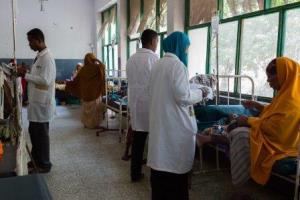 6 April 2017 – The WHO emergency response team and Ministry of Health officials visited cholera patients at the Banadir Hospital cholera treatment centre in Mogadishu to review care activities, available services and assess support needs. The visit was hosted by Dr Luul Hassan, head of the Banadir Hospital treatment centre, which has been providing cholera for more than 20 years.
6 April 2017 – The WHO emergency response team and Ministry of Health officials visited cholera patients at the Banadir Hospital cholera treatment centre in Mogadishu to review care activities, available services and assess support needs. The visit was hosted by Dr Luul Hassan, head of the Banadir Hospital treatment centre, which has been providing cholera for more than 20 years.
The Banadir region is composed of 17 districts hosting 1 million people. Yet there is only one cholera treatment centre in the Region providing cholera care services. The Banadir Hospital centre regularly receives patients from all over the Region, and often from Middle and Lower Shebelle regions as well.
The centre currently hosts up to 45 patients daily and 150 per week, mostly women and children. Multiple doctors attend to weak and malnourished patients who generally stay for up to 3 days, during which time they receive nutritional supplements, rehydration treatments and antibiotics. Due to the quality of services and care provided, mortality rates are comparatively low, but still there are gaps in case management and infection-control practices.
Since the beginning of the year, Somalia has recorded over 22 000 cases of cholera and 479 deaths across the country. This amounts to nearly 6-fold increase over the same period last year.
Dr Hassan explained that the rise in cholera cases has raised the need for additional medical supplies and funds to cover operational expenses such as electricity, water and sanitation. According to Dr Hassan, the centre urgently needs more cholera kits, medical supplies, oral rehydration salts, nutritional supplements and operational resources to maintain the quality of cholera treatment services.
“Most of the staff are volunteers, and although WHO has been generous to donate cholera supplies through the federal Ministry of Health, we must be prepared to support more patients once the rainy season starts,” said Dr Hassan.
WHO praised Dr Hassan and her team for the good quality of service and care provided, and reassured the hospital management and the Ministry of Health of their continued support in responding effectively to the cholera outbreak.
Although Somalia is a cholera-endemic country, the current drought and pre-famine conditions in Somalia have worsened the health situation due to food insecurity, loss of crops and livestock, and lack of access to clean water sources and environmental infrastructure. This has led to displacement of populations and raised the vulnerability to waterborne diseases.
Over 6.2 million people in the country require humanitarian assistance and nearly 5.5 million people are at risk of contracting waterborne diseases like cholera, more than half of whom are women and children under 5 years of age.


